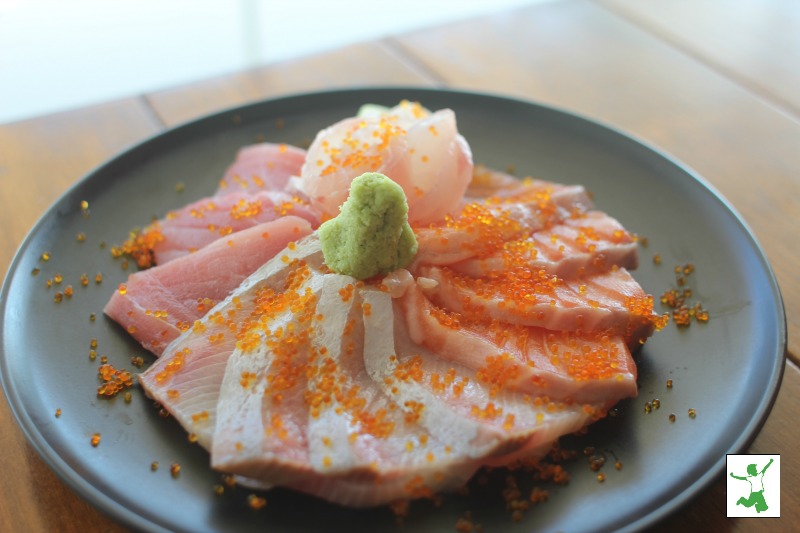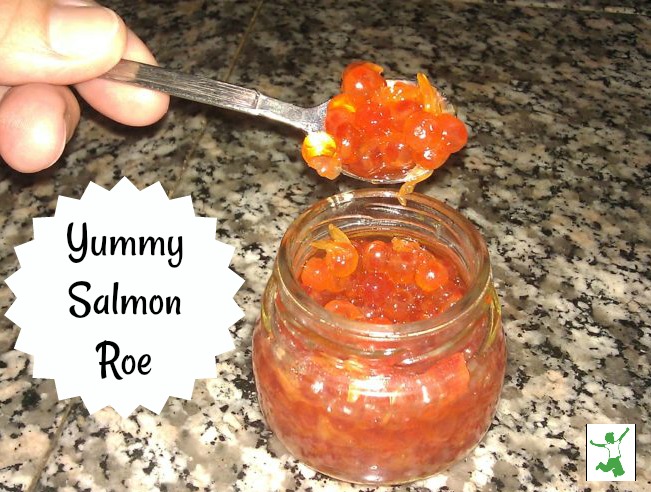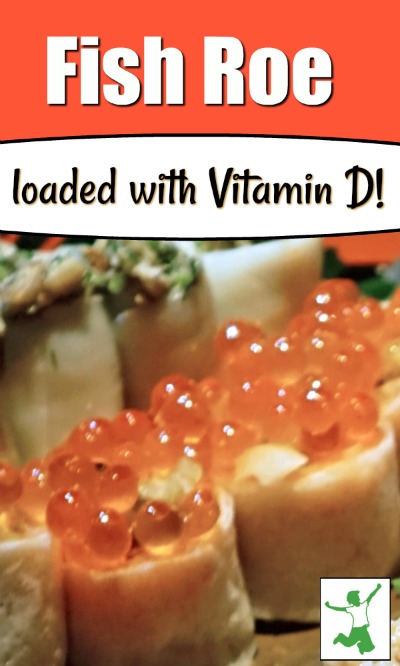Fish eggs are extremely high in vitamin D and a much safer and better choice than drops or pills for resolving this common nutritional deficiency. What to look for to source the highest quality roe with no additives.

Are fish eggs, also referred to as fish roe, a better choice than Vitamin D drops for resolving worrisome signs of vitamin D deficiency?
Vitamin D is surely the darling of supplements at the moment. More and more exciting news keeps coming out about this Wonder Vitamin and its beneficial effects in reducing the chances of many kinds of cancer, heart disease, and autoimmune disorders. The research is simply too groundbreaking to ignore.
I wrote a couple of posts last year about how the seasonal flu is really just Vitamin D deficiency disease and why I take a cod liver oil supplement every day even when I get good doses of midday Florida sunshine. I find the role of Vitamin D in the body and its ability to preserve health and reduce inflammation of all kinds very exciting.
Nearly 80% of People Deficient in Vitamin D
According to a study published by the peer-reviewed Archives of Internal Medicine, nearly 80% of Americans were deficient in this critical nutrient in 2009. Is it worse today? I would wager that it probably is given the advent of smartphones and less time spent outdoors! (1)
These numbers have even conventional doctors jumping on the bandwagon with more frequent testing. Supplementation is the solution commonly recommended when Vitamin D levels are too low to reap any health benefits.
While I think the enthusiasm over Vitamin D is wonderful, I personally do not feel comfortable with the casual way that high dose Vitamin D supplements are being recommended.
In some ways, it seems like Vitamin D has become just another drug!
Taking a single vitamin or nutrient in isolation is a practice that should be used with caution. This is especially true with Vitamin D, which is fat-soluble. Toxic blood levels from supplementation can and do occur.
For this reason, a food-based supplement that supplies Vitamin D is safer. In addition, a whole food source like high vitamin cod liver oil supplies not only Vitamin D, but also Vitamin A and other nutritional cofactors which work synergistically to prevent toxicity.
Watch out, though. Many cod liver oil brands are high-heat treated, which destroys the natural Vitamin D. Synthetic Vitamin D is added back after processing, but this fact is not indicated on the label.
Be sure to use only brands that do not heat the oil. This is the vetted and tested brand I use.
Vitamin D Foods and UVB Sunshine
What if your Vitamin D blood levels are so low that you can’t take enough cod liver oil each day to bring them up very quickly?
What if you live in a climate where getting a decent dose of midday UVB sunshine to produce Vitamin D via the skin is not an option for a substantial portion of the year?
Clearly, taking more than a teaspoon or two of cod liver oil each day to try and boost Vitamin D levels is not the answer in these situations.
Too much cod liver oil each day results in consuming too many omega 3 fatty acids. This can be just as bad as too little. Both scenarios can result in inflammatory conditions in the body.
In those instances, then, larger doses of Vitamin D are obviously required in addition to the daily dose of high vitamin cod liver oil.
However, there is a better and safer way to increase your Vitamin D blood levels quickly without those potentially dangerous high dose Vitamin D drops and pills!
Fish Eggs: Traditional Sacred Food to the Rescue
Fish eggs, also known as fish roe, were highly prized by the natives of South America who would sometimes travel hundreds of miles from their mountain villages down to the sea to procure it in dried form. This superfood was then provided to women of childbearing age to ensure healthy and robust babies and children.
The Eskimos also consumed fish roe from a number of fish species, particularly salmon. Fish eggs were dried for consumption during winter months and for special feeding to pregnant women.
How Much Vitamin D in Fish Roe?
It is no wonder fish roe was so highly prized by isolated natives.
According to an analysis carried out by the Weston A. Price Foundation, a single tablespoon of fish roe contains approximately 17,000 international units of vitamin D. (2)
In addition, fish roe contains vitamins A, K2, zinc, iodine, and the brain supporting omega 3 fatty acid DHA in ample amounts.
One tablespoon of fish eggs, then, supplies a similar amount of Vitamin D as a midday dose of Vitamin D on the skin!
Incidentally, one tablespoon of pastured lard clocks in at 10,000 IU of Vitamin D according to tests by the Weston A. Price Foundation. This healthy fat is a great alternative for those who are allergic to fish.
Synergistic Nutrients
Vitamin A and particularly Vitamin K2 work synergistically with Vitamin D to prevent toxicity and over calcification of the soft tissues, bones, heart, and/or kidneys, hallmark symptoms of Vitamin D overdose. The K2 can be the animal form (MK-4) or the fermented form (MK-7).
Given this information, doesn’t it seem much wiser to use fish eggs as that big Vitamin D boost rather than potentially dangerous and untested Vitamin D drops and pills?
The truth is that no one really knows what the long term effects of taking large doses of Vitamin D in isolation will be. Do you really want to be a guinea pig or do you want to use the safe and effective Vitamin D boost that the Eskimos and traditional mountain-dwelling tribes of South America used when sunlight was not a readily available option?
Where to Get Fish Eggs
I buy small glass jars of salmon roe at gourmet grocery stores for as little as ten to fifteen dollars.
The brand of fish roe I buy has only 3 ingredients: fish roe, salt, and water. Make sure the brand of fish eggs you choose does not contain any preservatives or colors added.
If you can find a fresh or dried source of caviar, so much the better!

How to Eat Roe
I love my salmon roe right off the spoon.
I eat 1/4 – 1/2 tsp in the morning with breakfast a few times a week. They are so salty and delightful. If you aren’t sure you like it at first, try it a few more times as roe can sometimes be a bit of an acquired taste.
If you simply can’t get used to fish eggs off the spoon, try some topped on whole-grain crackers with some creme fraiche.
Another option is to eat sushi! Many recipes for sushi rolls are topped with generous amounts of fish eggs.
Note that fish roe make great finger food for toddlers!
In my mind, fish eggs are a much superior – and delicious method for quickly raising and maintaining optimal Vitamin D levels.
What is your favorite way to eat fish roe? Do you like it off the spoon as I do?









yes my mum was telling someone to take high doses of vit d3 and magnesium today and i was trying to explain about Gaps and how it’s more important to get your gut working properly so that your food becomes your nutrition. those things are a quick fix and possibly dangerous in the long term, nutrition is the key. I am starting gaps intro on monday, I’ve been researching it for a year and am very excited, and all prepared.
Eat right and no supplements are needed!
I am also in the camp of folks who never had it before and want to incorporate it. Any good recommendations of brands or varieties?
Just don’t eat freshwater roe as it doesn’t contain the same nutrients as ocean based roe like iodine.
“Just don’t eat freshwater roe as it doesn’t contain the same nutrients as ocean based roe like iodine.”
Don’t eat it, as there is something wrong with it, or don’t eat it hoping for those nutrients, as it doesn’t compare in this way?
Thanks for the clarification 🙂
I’d like to know why also, as I just found a reputable source for wild caught, freshwater salmon roe.
Thanks!
Not knowing the intent of Sarah’s statement, I wanted to chime in with my own thoughts as this is something I have been researching lately. She may have other reasons for avoiding freshwater roe. There are 5 ways to obtain “seafood”.
1. Catch it in the ocean (the best because it has nutrients that other fish and seafood would not have.
2. Catch it in a natural stream or lake or other freshwater body. It wouldn’t have the same nutrients that #1 does, but would be a decent protein source.
3. Farm it responsibly. For example, a farmer friend has some freshwater shrimp and talapia ponds and puts solar-powered lights above the water to attract bugs to the surface that the fish eat. It wouldn’t have the same nutrients that #1 does, but would be a decent protein source.
4. Caged in the ocean. Supposedly there is a dead zone on the ocean floor beneath them and they are fed inappropriate food and treated with chemicals.
5. Caged in freshwater ponds and fed inappropriate food and treated with chemicals.
Strangely, all of these could be labeled “Wild Caught” if they were caught in a manner that employed boats and hooks or nets, just like how you would catch fish in the wild. You can also call “seafood” wild (different that wild caught) if the farmed spices is the same (or similar hybrid) as the variety found in the wild. Most (all??) of what you see in supermarkets and even some health food stores is farmed and labeled as wild or wild caught. So basically, if you don’t know and trust the people who did the catching, you don’t know what you have.
After finding out the other day that my roe came from a freshwater source, I spent a lot of time on the internet looking for roe that came from a fish caught in the ocean. So far, I have had no luck. If anyone has roe from source #1 above, I would love to know where you got it!
Are there any issues with Mercury?
Not that I have seen any research on anywhere. Of course, get your roe from a clean source if at all possible.
It seems like whenever I tell people that I take cod liver oil and greens powder instead of synthetic vitamins they look at me like I have two heads. Superfoods are soooo much better than isolated nutrients! Unfortunately I don’t care for fish eggs, but my friend has a recipe for a dip made with roe, olive oil, and sourdough bread pureed together and it is delicious!
Gabriella, could you please ask your friend to share her recipe! I would love to have that one!
Will you post it for us too? 🙂
Check this out: Taramasalata: A Seasonal Savior
http://nourishedkitchen.com/taramasalata/
Thanks! 🙂
What a great idea! I do not eat gluten so had not thought about fish roe in a while but do want to keep my d up! We sun at midday and I take suppliments so I will try this with yogurt and eggs!
Thanks for speaking of fatty liver disease I had just read Chris MasterJohns article and it was a great reveiw! You are a treasure!
Jean finch
I am in absolute awe of Chris Masterjohn’s work!
Yesterday for lunch I had some sauerkraut with homemade mayo (a cole slaw of sorts) sprinkled with salmon roes. Delicious!
Ah, I’ve been wondering about fish roe because my youngest (15 months old) is not a fan of the FCLO. Maybe he’ll like fish eggs until he reaches the age where I can more “force” him to take his daily dose. Thanks!
Is this the same kind of fish eggs put on some sushi rolls? We get sushi from time to time, even when pregnant, as a bit of a treat if we’re dining out. I usually asked for cooked rolls if I’m expecting, but just this past week I had sushi and wasn’t sure if all the rolls were cooked (what’s your opinion on that – raw fish while pregnant?) but I definitely saw those little orange beads on my sushi!
I’m happy to consume fish; I was thinking it might make up for my helter-skelter FCLO consumption while we were traveling, but I was very curious about the effects of uncooked sushi on a fetus. Of course, I have had crumbled cheeses too (like bleu & gorgonzola) and wondered if those were really no-nos. As you probably know, “unpasteurized milk is not recommended” by most medical personnel but WAPF says otherwise. Just curious about the cheese & fish though. Thanks, Sarah!
When I lived in Japan, I ate sushi a lot when I was pregnant and had five healthy children! I knew the raw fish I ate was very fresh. My ob/gyn never told me not to eat raw fish. I think it depends on the source and freshness of the fish and roe.
I didn’t know about traditional diets while I was pregnant but I craved salmon roe like crazy. I made my husband buy me a pound of it a few times and I ate it with big spoonfuls of Russian style sour cream. I figured it had omega 3s but I had no idea at the time it was a baby making food. Cheers to listening to your body!
Ashley, LOVE your story. I used to drink soymilk before getting pregnant with my first baby .. when I got pregnant I inexplicably couldn’t drink my beloved soymilk anymore. I’m sure now looking back that it was my body rejecting it as it would have been dangerous for me to drink it as it suppresses the thyroid and a strong thyroid is so important for a healthy pregnancy.
Dr. Natasha Campbell just put out a great article about listening to your body and its cravings.
http://www.doctor-natasha.com/one-mans-meat-another-mans-poison.php